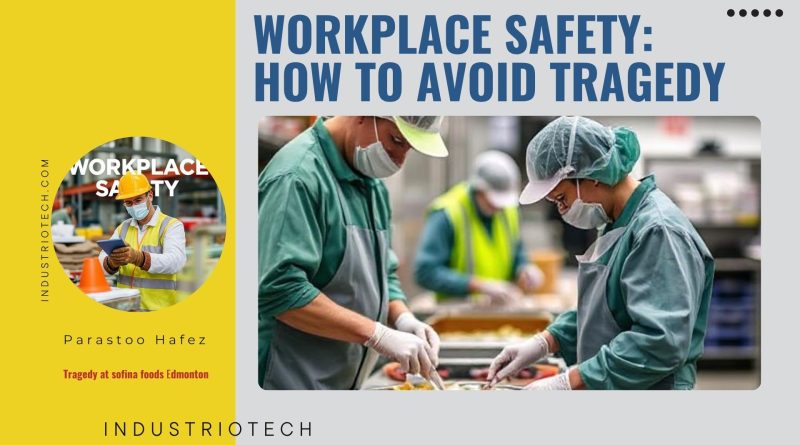Workplace Safety: How to avoid tragedy
Tragedy at Sofina Foods–Edmonton
On March 2, 2023, 32‑year‑old Samir Subedi, a superintendent at Sofina Foods’ Edmonton smokehouse, entered a gas-fired smokehouse to check its temperature. Unbeknownst to him, the emergency-release handle inside the chamber was broken, replaced by an unapproved door stopper requiring external release. Temperatures inside had soared to 92 °C, resulting in Subedi becoming trapped. Co‑workers later found him unconscious; he died in the hospital of thermal burns and heat exposure (thesafetymag.com).
Sofina Foods pleaded guilty to breaching Alberta’s Occupational Health and Safety Act by failing to ensure worker safety (hrlawcanada.com). In June 2025, the court imposed a CAD 330,000 penalty, directing funds to industry-wide safety training run by the Alberta Food Processors Association, particularly focused on confined-space hazards (hrlawcanada.com). The Crown withdrew 25 additional charges, citing the company’s early guilty plea and demonstrated remorse, including a CAD 500,000 gesture to Subedi’s family covering mortgage and other supports (thesafetymag.com).
Lessons Learned
- The emergency handle failure was foreseeable and known: handles had previously sheared off, but replacement protocols were lacking (burnabynow.com).
- Company safety systems were deemed comprehensive in theory, but implementation, monitoring, and training fell short (thesafetymag.com).
- The fatal incident was branded “entirely preventable” and rooted in “a gross level of negligence” (thesafetymag.com).
How a Strong ERP with Embedded Safety Could Have Helped
1. Real-time Maintenance Alerts
Artintech’s ERP safety module can track equipment parts (like emergency handles) and monitor maintenance logs. It would automatically:
- Flag repeated repairs or failures,
- Trigger work orders for inspections,
- Escalate overdue fixes through notifications, preventing bypass solutions like makeshift door stoppers.
2. Dynamic Risk Assessments
Confined-space entry would be governed by Artintech’s dynamic checklists:
- Pre-entry prompts enforce safety checks,
- Digital lockouts document door status and safety interlocks.
- Access is restricted unless conditions are verified safe, with timestamped digital logs.
3. Automated Training & Compliance Tracking
Artintech helps streamline:
- Scheduler-based refresher training (e.g., quarterly smokehouse door procedures),
- Confirmation logs showing who is certified and when retraining is due,
- Alerts for expired training, reducing human error from untrained staff, like the one Subedi may have been.
4. Incident Logging & Predictive Analytics
Even near-miss events (e.g., door hardware bracing) are recorded. Artintech analyses patterns over time and surfaces early warnings:
- If Door A has three brace incidents, the system suggests immediate preventive replacement.
- Mitigates risk before catastrophe, rather than reacting after a fatality.
5. Integrated Reporting & Audit Trails
When regulators scrutinize safety violations, Artintech provides:
- Timestamped logs of maintenance, inspections, incidents, and trainings,
- Easy export of audit records,
- Demonstrable due diligence, showcasing proactive control and potentially lowering penalties or legal exposure.
Conclusion: From Reactive to Proactive
Sofina’s facility had safety systems on paper, but lacked the continuous implementation, verification, and feedback needed to prevent a preventable death. An integrated ERP like Artintech, with strong safety, maintenance, and training modules, fosters:
| Benefit | How Artintech Helps |
|---|---|
| Preventive maintenance | Automated alerts ensure critical safety hardware is always functional |
| Structured confined-space procedures | Digital checklists discourage bypasses and enforce compliance |
| Training oversight | Automatically tracks certifications, reducing human error |
| Data-driven insights | Predictive analytics prevent failure modes and inform upgrades |
| Regulatory readiness | Transparent logs support compliance and reduce legal risk |
Had Artintech’s system been in place, Sofina’s management would’ve had early warnings about malfunctioning emergency handles, required operator training verification, and automated inspection reminders—likely preventing the entry of Subedi into an unsafe smokehouse and the resulting tragedy.
By moving from a paper-based “tick‑a‑box” system to a digitally enforced, real‑time safety culture, ERP solutions like Artintech don’t just record compliance—they enable it, potentially saving lives and protecting organizations from devastating outcomes.




